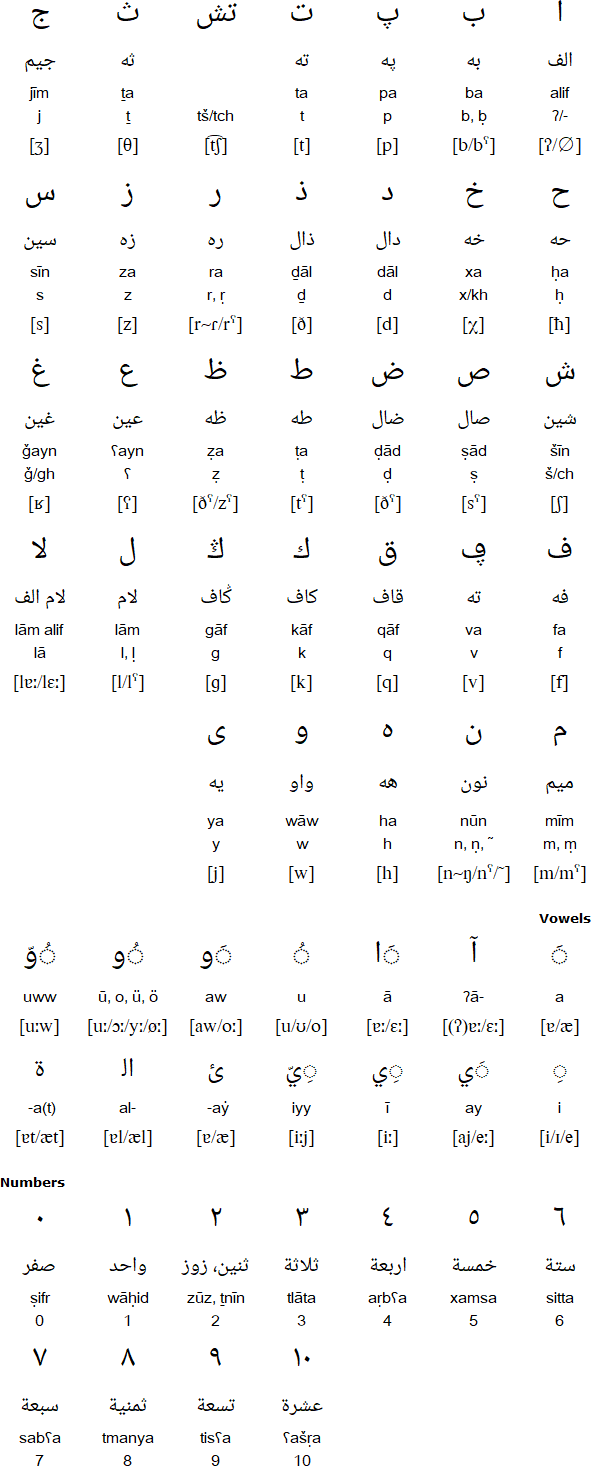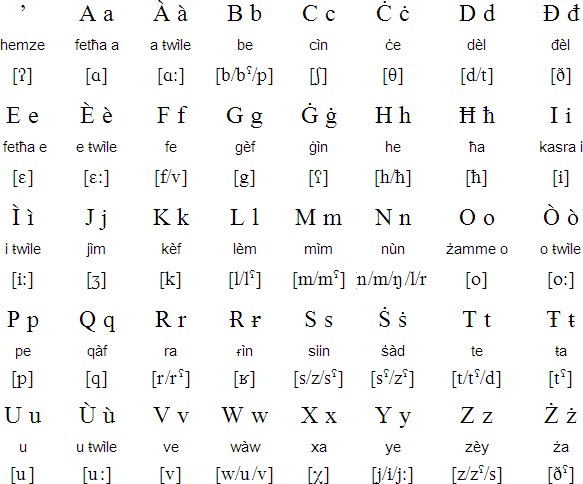Tunisian Arabic is a variety of Maghrebi Arabic spoken in Tunisia by about 11.2 million people. It has similiarities to Algerian Arabic and Libyan Arabic, and is closely realated to Maltese. It differs significantly from Modern Standard Arabic, and while its vocabulary is mainly Arabic. it has a significant substratum of Berber words, and also loanwords from French, Turkish, Italian and Spanish.
Tunisian Arabic is spoken in Tunisian homes and businesses, and is used in television programmes, films and plays, however standard Arabic is the language of education, literature and news programmes and newspapers. There is very little literature in Tunisian Arabic, and it is mainly written with the Arabic script.

The Elyssa Alphabet was invented by Ramzi Hachani as a way to write Tunisian Arabic with the Latin alphabet. It is based on the Maltese alphabet with the addition of 3 letters with diacritics. It was first published in September 2015, and finalised in December of the same year.

More information about the Elyssa Alphabet
https://tuni1259.wordpress.com/
صاحب اللسانين معدود ب ثنين.
Ṡàħib il-lsènìn magħdùd b’cnìn
A man who speaks two languages counts as two men.
كثرت الكلام تطيح الحرمه و كثرت اذوق تنقص البرمه.
Kucrat il-klèm tŧayyaħ il-ħurme w kucrat iđ-đweeq tnaqqiṡ il-burme.
The abundance of language diminishes consideration, just as the frequency of tasting diminishes (the content of) the pot.
اول هبال الي يعطي بنت عمم ل الرجال؛
ثاني هبال اللي يطلا ل السوق بلاث مال؛
ثالث هبال الي يعاند الصيوده في روس الجبال؛
رابع هبال الي يعارك و مه عله كتاف رجال.
ewwel hbèl illi yagħŧi bint għammu l’ir-rjèl ;
cèni hbèl illi yaŧlaà l’is-sùq blèċ mèl ;
cèlic hbèl illi ygħànid iṡ-ṡyùde fi rùs ij-jbèl ;
ràbigħ hbèl illi ygħàrik w me għle ktèfu rjèl
First madness: to let strangers marry his first cousin.
Second madness: going to the market without having any money on you.
Third madness: attack the lions on the tops of the mountains.
Fourth madness: start a fight without having support.
Source: http://tuni1259.org/sample-texts/
الناس الكل ملدين حرين و متساوين في الكرامه و الحقوق. تعطاو عقل و ظمير و لازم يعامل بعظهم كيف الاخوا.
(البند الاول متع العلان العالمي متع حقوق الانسان)
In-nès il-kull muludìn ħurrìn w mitsèwìn fi’l-karàme w’il-ħuqùq. Tagħŧàw għqal w żamìr w lèzim ygħàmlu bgħażhum kìf l-axwa.
(il-bend l-uwwil mtagħ l-igħlèn il-għàlemi mtagħ ħuqùq l-insèn)
Hear a recording of this text by Zein AlAbdeen Shbeeb
All human beings are born free and equal in dignity and rights. They are endowed with reason and conscience and should act towards one another in a spirit of brotherhood.
(Article 1 of the Universal Declaration of Human Rights)
Details and corrections by Ramzi Hachani, Michael Peter Füstumum and Yassine Slama.
Information about Tunisian Arabic
https://en.wikipedia.org/wiki/Tunisian_Arabic
http://tuni1259.org
https://www.ethnologue.com/language/aeb
Tunisian Arabic phrases
http://www.17-minute-world-languages.com/en/tunisian-arabic/
http://www.nomarmiteintunisia.co.uk/tunisianphrases.htm
http://www.the-backpacking-site.com/countries/tunisia-phrase.html
A proposal for a standard written Maghrebi Arabic
http://works.bepress.com/Emad-Adel/1/
- Learn Arabic online with ArabicPod101
- TalkInArabic.com - learn colloquial Arabic of Algeria, Egypt, Iraq, the Levant, Morocco, Saudi Arabia, or Tunisia

- eArabic Learning - Learn Arabic Online with Live Teachers
- Learn Arabic with Glossika
- Learn Arabic now at Rocket Languages!
- Arabic Genie - a quick and easy way to learn the Arabic alphabet
Find Arabic Tutors with LanguaTalk
Arabic courses and other resources available on Amazon
Algerian, Bedawi, Chadian, Cypriot, Egyptian, Gulf, Hassaniya, Hejazi, Lebanese, Libyan, Modern Standard, Moroccan, Najdi, Sudanese, Syrian, Tunisian
Akkadian, Amharic, Arabic (Algerian), Arabic (Bedawi), Arabic (Chadian), Arabic (Egyptian), Arabic (Gulf), Arabic (Hassaniya), Arabic (Hejazi), Arabic (Lebanese), Arabic (Modern Standard), Arabic (Moroccan), Arabic (Najdi), Arabic (Sudanese), Arabic (Syrian), Aramaic, Argobba, Assyrian / Neo-Assyrian, Canaanite, Chaha, Chaldean Neo-Aramaic, Ge'ez, Hadhramautic, Harari, Hebrew, Himyaritic, Jewish Neo-Aramaic, Maltese, Mandaic, Nabataean, Neo-Mandaic, Phoenician, Punic, Qatabanic, Sabaean, Sabaic, Silt'e, Syriac, Tigre, Tigrinya, Turoyo, Ugaritic, Western Neo-Aramaic
Information about Arabic | Phrases | Numbers | Tower of Babel | Articles | Links | Arabic courses on: Amazon.com and Amazon.co.uk [affilate links]
Page last modified: 15.03.23
[top]
You can support this site by Buying Me A Coffee, and if you like what you see on this page, you can use the buttons below to share it with people you know.

If you like this site and find it useful, you can support it by making a donation via PayPal or Patreon, or by contributing in other ways. Omniglot is how I make my living.
Note: all links on this site to Amazon.com, Amazon.co.uk
and Amazon.fr
are affiliate links. This means I earn a commission if you click on any of them and buy something. So by clicking on these links you can help to support this site.
[top]